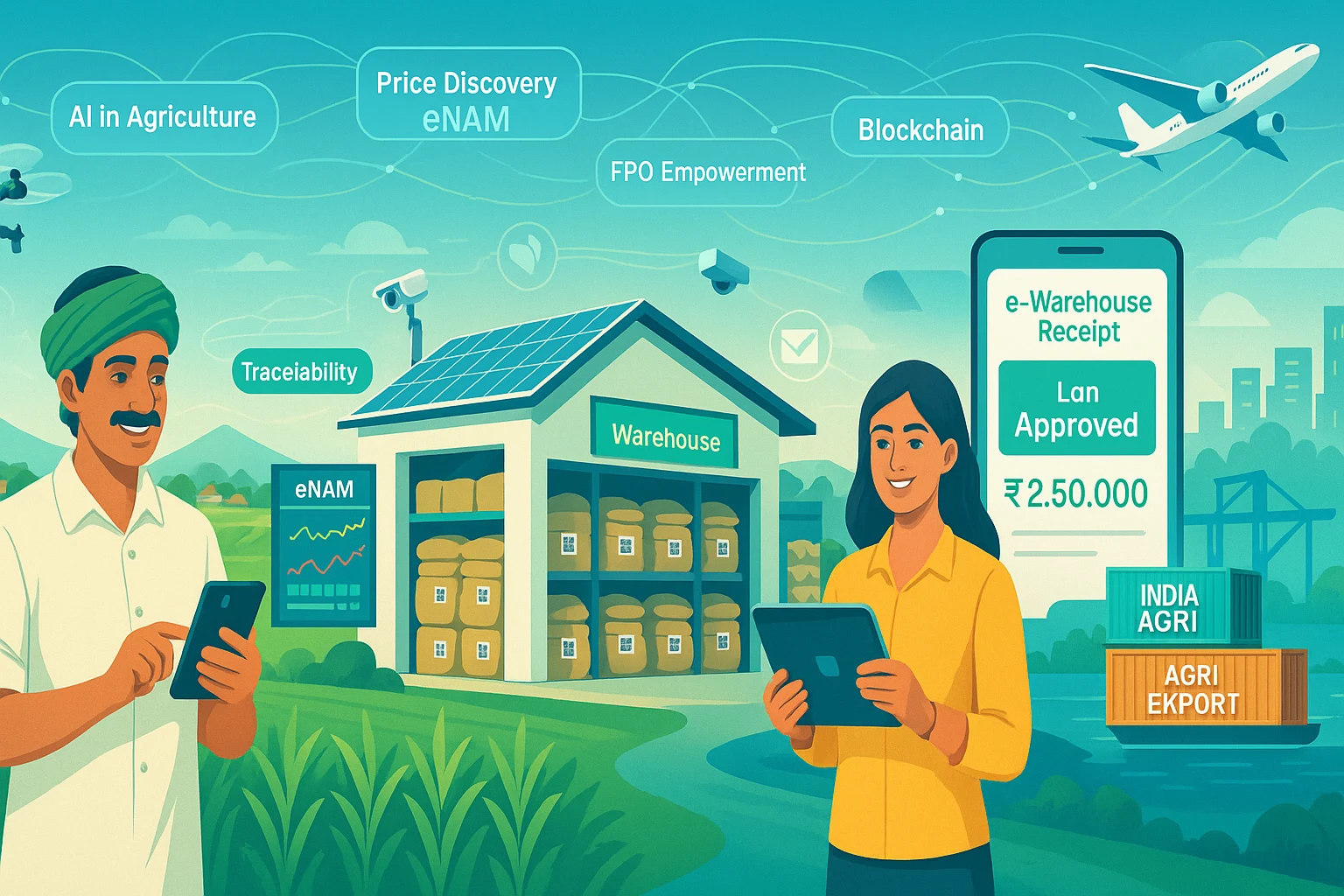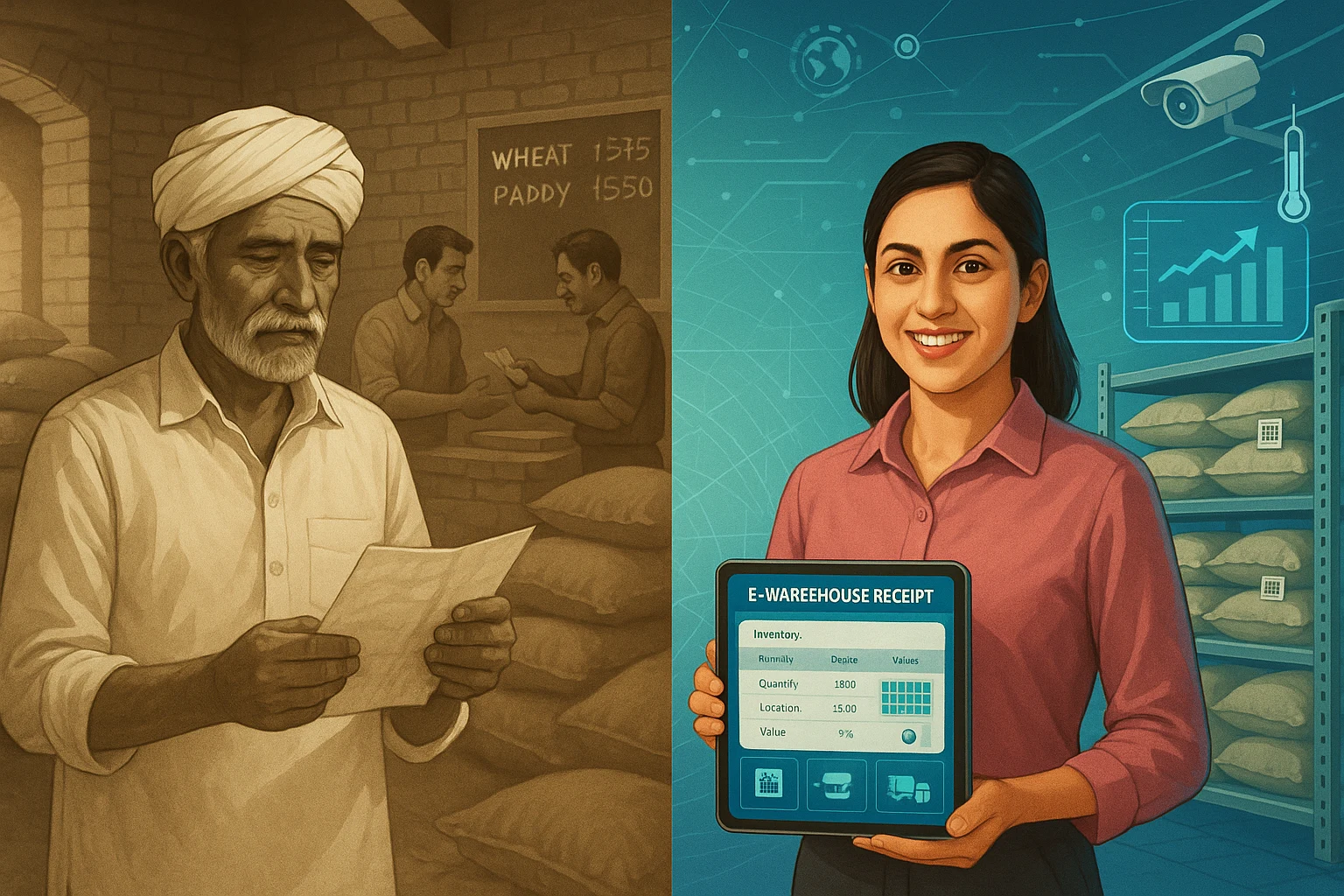Agriculture in India is no longer limited to just growing crops, but it is now developing more intelligently.
Across the country, we are witnessing major changes in the way agricultural produce is bought, sold, stored, financed, and transported. This is the age of digital agri-commerce in India, where smartphones, smart warehouses, and agri-fintech platforms are replacing traditional middlemen, paperwork, and uncertainty.
From FPOs and farmers to commodity traders and agri exporters, everyone is looking at how tech-driven agri trading platforms can help them access better markets, make faster payments, and more confidence in transactions. And for businesses like Staragri, this change isn’t just exciting, it’s a mission to empower India’s agricultural value chain.
Let’s take a deeper look at how digital transformation in agriculture is redefining agri-commerce in India.
What Is Digital Agri-Commerce?
Digital agri-commerce refers to the use of technology to manage and streamline every stage of agricultural trade, from farm to market to finance.
It includes:
- Agri trading platforms and e-Mandi systems that connect buyers and sellers online
- Digital warehousing that provides real-time inventory updates, stock monitoring, and loan-ready documentation
- Data analytics tools that help traders, exporters, and banks understand trends, forecast demand, and make informed decisions
In short, digital agri-commerce transforms the traditionally unorganised sector into a transparent, efficient, and scalable ecosystem.
Why Is Tech-Driven Agri Trading on the Rise?
The rapid growth of tech-enabled agricommerce in India is driven by several game changing developments:
-
Massive Growth in Rural Connectivity
With over 350 million rural Indians now using the internet according to IAMAI, progressive farmers, FPOs, and agri entrepreneurs are actively engaging with digital platforms. Mobile apps and WhatsApp groups are replacing chalkboards and commission agents.
-
Government-Led Reforms like eNAM
The launch of eNAM (Electronic National Agriculture Market) has accelerated the growth of digital agri trading platforms across the country. Over 1,260 mandis in 22 states have been integrated with eNAM, enabling more than 1.75 crore farmers to sell their produce directly to buyers across state boundaries, thereby increasing competition and price realisation.
-
Boom in Agri-Tech Startups
India’s agri-tech innovations, including platforms providing blockchain in agri supply chain, IoT-enabled storage, and AI-based price prediction tools, are solving deep-rooted inefficiencies using intelligent, user-friendly interfaces.
-
Demand for Transparency and Traceability
Buyers, especially exporters and institutional buyers want traceable, certified, and quality assured produce. Over 65% of agri exporters now prefer traceable supply chains and this is only possible through digital platforms that track the produce from source to destination.
-
Need for Faster & Easier Credit Access
With the rise of digital warehousing and e-Warehouse Receipts, farmers and traders can now use stored goods as collateral to access financing quickly even without land ownership or traditional paperwork.

Who Benefits From Digital Agri-Commerce?
Digital agri-commerce in India benefits a wide range of stakeholders across the supply chain:
Farmers and FPOs
- Direct access to markets and buyers, eliminating multiple intermediaries
- Fair and real-time price discovery, increasing earnings
- Digital records of transactions, useful for loans, insurance, and auditing
- Reduced risk of exploitation or delayed payments
Agri Traders, Exporters, and Commodity Buyers
- Digital tracking of stock and movement for better logistics planning
- Quality certification and standardization, enhancing global competitiveness
- Faster procurement cycles, and access to produce available in nationwide warehouses
Banks, NBFCs, and Agri-Fintech Lenders
- Use of e-Warehouse Receipts as verified, digital collateral
- Improved loan recovery and reduced NPA risk
- Streamlined, data-driven agri lending systems
Agri Warehousing & Logistics Companies
- Integration with digital inventory management and billing systems
- Efficient stock rotation, quality control, and remote monitoring
- Digitally enabled services like insurance, grading, and loan facilitation
The Role of Staragri in Empowering Digital Agri-Commerce
As a pioneer in the Indian agri value chain, Staragri has been instrumental in bridging the gap between traditional agriculture and digital transformation.
Here’s how Staragri’s digital solutions are making a real impact:
-
Smart Warehousing Infrastructure
Staragri’s digital warehouses are equipped with barcode-enabled inventory, remote monitoring, and climate monitoring systems, turning stored commodities into real-time data assets. This makes tracking, auditing, and financing easier and more reliable.
-
e-Warehouse Receipts & Collateral Management
Through its e-Warehouse Receipt system, Staragri enables farmers, traders, and FPOs to convert stored commodities into collateral-free credit. This will accelerate access to capital and promote financial inclusion in rural India.
-
Integrated Digital Supply Chain Management
From procurement to storage and financing, Staragri offers acomplete digital ecosystem. Customers can manage commodity flows, documentation, and analytics through an intuitive interface.
-
Customized Agri-Tech Solutions
Whether you are a smallholder farmer, a large trader, or a government procurement agency, Staragri’s digital platform offers scalable solutions tailored to your needs, with a strong focus on security, transparency, and traceability.
The Impact of Digital Agri Commerce: More Than Just Convenience
The true value of tech-driven agriculture trading platforms in India lies not just in efficiency, but in empowerment.
- 30–50% faster turnaround time for commodity transactions
- Up to 20% better price realization for producers
- Reduced loan processing time by 70%
- Stronger trust and compliance in institutional procurement
In a country where agriculture supports nearly 60% of the population, these improvements are not minor — they are transformational.
The Future of Agri Trading in India Is Digital — Are You Ready?
The FAIFA Indian Agriculture Outlook project that 70% of agri trading in India will be digitized by 2030. That means businesses that fail to adapt may risk falling behind, both in competitiveness and in market access.
But for those who embrace smart agriculture platforms, the rewards will be substantial:
Faster payments
Larger customer networks
Improved margins
Data-driven decision making
Partner with Staragri to Digitize Your Agri Business
At Staragri, we believe in building India’s agri future on a foundation of trust, technology, and transparency. Our goal is to empower every link in the agri value chain — from farm gate to global trade.
Whether you’re a farmer, exporter, FPO, or agri enterprise, we’re here to help you digitize, grow, and lead with confidence.
Ready to take your agri business digital? Contact Staragri today.



